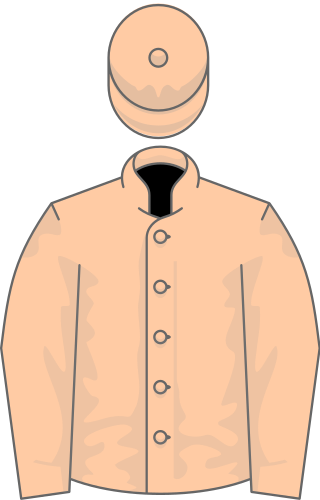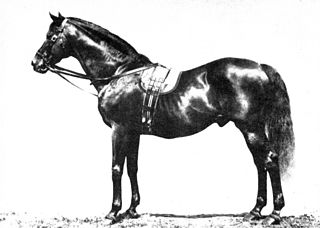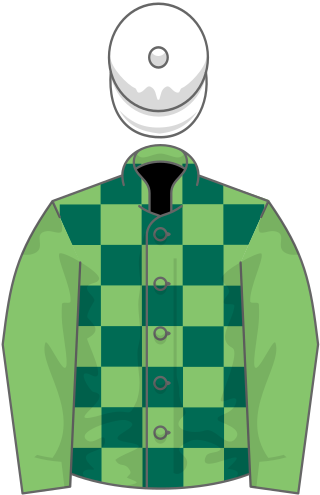Related Research Articles

Slip Anchor (1982–2011) was a British Thoroughbred racehorse best known for winning the 1985 Epsom Derby by seven lengths. After showing some promise as a two-year-old, he showed substantial improvement in the spring of 1985, winning the Derby Trial at Lingfield Park Racecourse by ten lengths before recording a rare start-to-finish win in the Derby. He was rated the best racehorse in Europe in 1985. His subsequent career was disrupted by injury, and he finished second in his other three races before being retired to stud. He had some success as a breeding stallion and died in 2011.

Galopin (1872–1899) was a British Thoroughbred racehorse and sire. In a racing career which lasted from June 1874 until October 1875 he ran nine times and won eight races. He was one of the best British two-year-olds of 1874, winning his first three races before sustaining the only defeat of his career in the Middle Park Plate. In 1875, he won all five of his races including the Derby. At the end of the season he was retired to stud where he became an extremely successful and influential breeding stallion.
Never Say Die (1951–1975) was an American-bred, British-trained Thoroughbred racehorse. After winning only once from his first nine races, he demonstrated much improved form in the summer of 1954 to win the Derby, becoming the first American-bred colt to win the race in 73 years. Later that year he added a second British Classic, when winning the St. Leger Stakes by a record margin of twelve lengths. He was later retired to a successful stud career.
Cacique is a retired Thoroughbred racehorse who competed in Europe and the United States. Bred and raced by Khalid Abdullah's Juddmonte Farms, Cacique is the son of the great international Champion sire, Danehill. He was out of the fantastic mare, Hasili whose damsire, Kahyasi, won the 1988 Epsom and Irish Derbys. Cacique is a full-brother to Breeders' Cup winners Banks Hill and Intercontinental and to Grade One winner Champs Elysees and Grade One-placed and Leading sire in France, Dansili.
Opening Verse (1986–2002) was a Thoroughbred racehorse who competed in England and the United States.

Empery was an American-bred, French-trained racehorse best known for winning the 1976 Epsom Derby. In a racing career which lasted from September 1975 until July 1976 he ran eight times and won two races. Empery showed some good form in France to be placed third in the Prix Lupin but appeared to be some way below the best colts in his own country. He comfortably defeated the best of the British colts in the Derby to give his jockey Lester Piggott a seventh win in the race. Empery finished second in his only subsequent start and was retired to a stud career of limited success.
Sir John Layton Jarvis was a British trainer of racehorses. Born into a racing family, Jarvis had a brief but successful career as a jockey before taking up training. He was one of the most prominent British trainers of the mid 20th century, winning nine British Classic Races and being the British flat racing Champion Trainer on three occasions. In 1967 he became the first trainer to be knighted for services to horse racing.

Humorist (1918–1921) was a British Thoroughbred racehorse. He was a leading two-year-old in 1920 and finished third in the 1921 2000 Guineas before winning the Derby at Epsom. Less than three weeks after the Derby, Humorist died in his stable from a lung haemorrhage caused by a tubercular condition.
Sansovino (1921–1940) was a British Thoroughbred racehorse and sire. In a career which lasted from 1922 to 1924 he ran twelve times and won six races. His most significant victory came as a three-year-old in 1924 when he won The Derby by six lengths in some of the most difficult conditions in the race's history. He went on to have a modestly successful career at stud.
Ocean Swell (1941–1954) was a British Thoroughbred racehorse and sire. In a career that lasted from 1943 to 1945 he ran fifteen times and won six races. As a three-year-old 1944 he won the New Derby, a wartime substitute for The Derby run at Newmarket. He later developed into a specialist stayer, winning the Jockey Club Cup in the autumn of 1944 and the Gold Cup at the following summer. He was then retired to stud where he had limited success.
Straight Deal (1940–1968) was a British Thoroughbred racehorse and sire. In a career that lasted from 1942 to 1943 he ran ten times and won five races. His most important success came in June 1943 when he won the “New Derby”, a substitute race for The Derby run on the July Course at Newmarket. During the Second World War, many racecourses were closed either for safety reasons or for military use, with Epsom Downs Racecourse being used as the location for an anti-aircraft battery. Straight Deal was retired after finishing third in the “New St Leger” later that year and went on to become a successful stallion.
Premonition (1950–1970) was a British Thoroughbred racehorse and sire. In a career which lasted from autumn 1952 until July 1954 he ran fourteen times and won eight races. He won the Classic St Leger as a three-year-old in 1953, a year in which he also won the Great Voltigeur Stakes and was controversially disqualified in the Irish Derby. He won the Yorkshire Cup as a four-year-old in 1954 before being retire to stud, where he made very little impact as a stallion.
William Day was a British jockey and trainer. A member of a large and successful racing family, Day had some success as a jockey before setting up as a trainer at Woodyates, Dorset in 1848. In a training career of over thirty years he sent out the winners of three classics and numerous major handicap races before retiring in the 1880s. His best horse was probably the American colt Foxhall. Day was also a gambler who was involved in scandals and clashes with other racing figures.
Niksar (1962–1980) was a French-bred, British-trained Thoroughbred racehorse and sire, best known for winning the classic 2000 Guineas in 1965. After failing to win as a two-year-old he won his first race of 1965 by six lengths before winning the Guineas at Newmarket Racecourse. He failed to win in his remaining five starts and was retired at the end of the season with a record of two wins and two places from ten starts. He had moderate success as a breeding stallion in Australia and Japan.

Reform (1964–1983) was an Irish-bred British-trained Thoroughbred racehorse and sire. In a racing career which lasted from April 1966 until October 1967 he won eleven of his fourteen races. As a two-year-old he was beaten on his debut but won his remaining six races and was rated among the best colts of his generation in Britain. Reform was never entered in the British Classic Races, but proved himself to be an outstanding three-year-old in 1967, winning five of his seven starts. After winning the St James's Stakes, St James's Palace Stakes, Sussex Stakes and Queen Elizabeth II Stakes he ended his career by beating The Derby winner Royal Palace in the Champion Stakes.
Vitigès was a French-bred Thoroughbred racehorse and sire. He was one of the best French-trained two-year-olds of 1976 when he won four races including the Prix Robert Papin and Prix Morny, as well as finishing second in the Prix de la Salamandre. In the following year he won the Prix Djebel and finished second in both the 2000 Guineas and the Prix Jacques Le Marois before being transferred to be trained in England. In October 1976 he recorded his greatest success when recording an upset win over a strong field in the Champion Stakes which led to his being rated the best three-year-old to race in the United Kingdom that year. He ran without success as a four-year-old and was retired to stud, where he had some success as a breeding stallion.
Arctic Tern was an American-bred, French-trained Thoroughbred racehorse and sire. He was campaigned at the highest level in Europe for three seasons, winning four of his twenty-one races including the Prix Thomas Bryon in 1975, the Prix de Fontainebleau in 1976 and the Prix Ganay (1977). He was also placed in several major races including the Prix Lupin and the Eclipse Stakes. After his retirement from racing, Arctic Tern became a successful breeding stallion with the best of his progeny being Bering.
Walter Earl (1890–1950) was a British Thoroughbred racehorse trainer. After a riding career of limited importance he became a private trainer, first for Solomon Joel and later for Lord Derby. He was one of the most successful trainers of the 1940s, sending out the winners of six classics and winning the title of Champion Trainer in 1945. His best horse was Alycidon who won the Ascot Gold Cup in 1949.

Tranquil was a British Thoroughbred racehorse and broodmare. She showed considerable promise as a two-year-old when she won one race and finished second in the Gimcrack Stakes. In the following season she was one of the best horses in Britain, scoring classic victories in the 1000 Guineas and St Leger Stakes as well as winning four other races including the Jockey Club Cup and Newmarket Oaks. She won once in 1924 before her racing career was ended by injury. She made no impact as a broodmare.
Tommy Carey was a Derby winning flat racing jockey.
References
- 1 2 Mortimer, Roger; Onslow, Richard; Willett, Peter (1978). Biographical Encyclopedia of British Flat Racing. Macdonald and Jane’s. ISBN 0-354-08536-0.
- ↑ "Death of William Nightingall". The Advocate (Tasmania) . 18 December 1926. Retrieved 16 November 2014.
- ↑ "Derby is captured by Straight Deal". Montreal Gazette . 19 June 1943. Retrieved 15 November 2011.
- ↑ Robin Oakley (20 January 2010). "Epsom revival". The Spectator. Retrieved 16 November 2014.
- ↑ "Sea Bird whips Canadian-owned horse in Derby". Montreal Gazette. 3 June 1965. Retrieved 20 June 2012.
- ↑ Morris, Tony; Randall, John (1999). A Century of Champions. Portway Press. ISBN 9781901570151.
7. Eacott, Bill (2019) A History of Racehorse Training at Epsom. C.W. Eacott ISBN 9780954827830